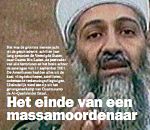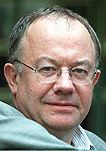A Special Day
From the desk of Koenraad Elst on Sat, 2011-09-10 20:30

Every year since 2001, September 11 is "una giornata particolare" (a special day) or, as Flemish news anchor Martine Tanghe once said, "the most famous date of the year". For those who consider the U.S. to be the navel of the world, September 11, 2001 was a day when everything changed. The problem of Islam, that had already made millions of victims elsewhere, had made a further three thousand in the U.S. The rumors about jihad, somewhere in distant lands, suddenly became very real.
Or not really. There was much "hype" around September 11, and much beating around the bush about what exactly was going on. "This crusade, this war on terrorism is going to take a while," President G.W. Bush said on the evening of September 11. Oops, that word "crusade" was poorly chosen. The following day, he called on Americans to come together in your "churches, synagogues and mosques". On September 17 he visited the Islamic Center in Washington DC, like many politicians who at that time frequented mosques: "The face of terror is not the true face of Islam." This could perhaps be justified for a leader who tries to calm the public mood, but not the nonsense that he told on other forums: "Islam is the religion of peace." (2007) Quoting from the Quran, he said that "evil will be the end of the wicked who mock the signs of God" - clearly not realizing that "signs of God" is the technical term for Quranic verses. That passage is a curse on anyone who is skeptical towards the Koranic verses, i.e. all non-Muslims.
Mass murderer
His pal Tony Blair, a veteran of the terror bombing of Serbia in 1999, intended as an aid to the emerging Muslim state of Kosovo, has never uttered one critical word about Islam. Bush and Blair have, for all their flattery about Islam, sent hundreds of thousands of Afghan and Iraqi Muslims to their deaths. So it has been experimentally proven: not the criticism of Islam, but flattery towards Islam leads to violence against Muslims.
Incidentally, they also have made hundreds of thousands of Christians flee from Iraq, and they replaced the secular socialist rule of Saddam Hussein by a government that leans closely towards the Iranian ayatollahs.
September Eleven was mainly the beginning of a massive propaganda offensive in favor of Islam. While we're hearing every day news of Islamic violence, we are assured that Islam has absolutely nothing to do with it. Partly out of disgust at this systematic deception, some Islam-critical websites have seen the light, like Jihad Watch, Gates Of Vienna, and from some former Muslims: Faith Freedom and the Institute for the Secularization of Islamic Society. Their voice remains marginal, while the negationist media offensive continues full steam ahead.

A good example is the recent article on the Sept. 11 anniversary in the Flemish weekly Knack. The headline evokes the elimination of Osama bin Laden: "The end of a mass murderer". In the six page article, the word "Islam" occurs only once, to say that he was buried with Islamic rites. He was a jihadist, one of the thousands who worked on the same Islamic agenda, but the intention here is to equate him with a disturbed loner who commits mas murder as a cry for attention.

In the next article, even Olivier Roy, an expert on Islam, equates Bin Laden with the brilliant but deranged Norwegian loner Anders Breivik: both are "vanguard without supporters". Sure, Bin Laden was brilliant. But there is no indication that he was disturbed, only consistent in his faith. And a loner without a constituency he was not. He was able to recruit many Muslims for his own organization, even from Europe, while thousands more Islamic terrorists from other groups explicitly operated out of the same motive: Islam.

Roy minimizes the scenes of jubilation in the Muslim world after the images of the collapsing twin towers were broadcast. In the immigrant neighborhoods of Europe, these scenes were indeed rather limited, probably because subsidized Muslims were conscious about the image of Islam they would project. The true face of Islam, however, is seen in places where it does not have to worry about the opinion of a majority of unbelievers, and in those places cheers were clearly heard. The now well-known Norwegian Arabist Peder Jensen (Fjordman) witnessed them in Cairo, and Flemish TV reporter Rudi Vranckx in Morocco.
Clash

The book that is invariable quoted in debates on September 11, is Samuel Huntington's Clash of Civilizations. According to Roy, the idea of "a clash of civilizations, especially between the Islamic world and the West, does not originate from Huntington, but from Islamic scholar Bernard Lewis". Well, if we are looking for origins, let's go straight to the real source. That Islam is constantly at war with the world of unbelief, is a central doctrine of Islam itself, effective since the Prophet and since then often applied.
That this clash has remained relatively limited in the current time frame, is something we owe not to the chimera of a peaceful Islam, but to the fact that Muslims in the slipstream of Western material goods, are assimilating more and more non-Islamic cultural elements. We hope that Roy is right where he claims that the Turkish ruling party no longer pursues an Islamic republic, and has really accepted democracy. Meanwhile, Erdogan is dreaming aloud about the Islamization of Europe. The gradual interiorization of the values of freedom and democracy is reflected in the slogans of the Arab spring, but it is mixed with the old demons of Islam.
That Islam has failed as a formula for governing a modern state, is certain. Hence it is not Islamic states that generate enthusiasm, but the militant non-state actors such as Hezbollah, Hamas and, in the first year after Sept. 11, Al-Qaeda. Since then, the group of Osama bin Laden's has lost much of its feathers, due to its strategic errors in Iraq and due to U.S. military pressure. But as long as Islam is flourishing, the belly of the beast that spawned him, remains fruitful.

"arab spring"
Submitted by Wesley on Sun, 2011-10-02 17:34.
"The gradual interiorization of the values of freedom and democracy is reflected in the slogans of the arab spring.." Oh really. The author must have heard entirely other slogans than I did. I only heard one: "allahu akhbar".